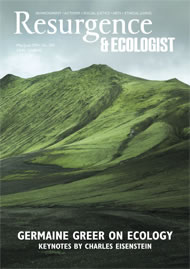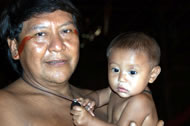Written by a Yanomami shaman and a French anthropologist united by more than 30 years of friendship (as well as a shared passion for both Yanomami culture and philosophy, and spiritual ecology), this beautifully crafted book gets its title from a myth about the cataclysmic end of the world. In fact, it would not be wrong to say that the ‘falling sky’ invaded by deadly smokes of metal and fuel is the book’s main protagonist. It is this anthropomorphised entity, at once threatening and ever so fragile, that the Yanomami urge us to take seriously:
“Beyond our own fate, we also worry about the entire world, which could well turn to chaos. Unlike us, the white people are not afraid to be crushed by the falling sky. But one day they may fear that as much as we do! The shamans know a great deal about the bad things that threaten human beings. There is only one sky and we must take care of it, for if it becomes sick, everything will come to an end.”
The long shamanic chant that makes up the book opens up a multitude of interior journeys and provides a new consciousness of the world as a whole. For humanity to progress, the chant goes, the entire forest, the great forest-land-earth must be defended, “including the one human beings do not inhabit”. Yanomami shamans protect Nature in its entirety, by defending “the forest’s trees, hills, mountains, and rivers, its fish, game, spirits, and human inhabitants”. They do so with the help of their xapiri auxiliary spirits. Relentlessly and awesomely, shamans and their xapiri battle against the dark forces that lurk all over and threaten the good health, wellbeing, and balance of the forest universe, making it cool and beautiful, even when the rains become scarce.
Yanomami wisdom is acquired through dreaming. All Yanomami, shamanic initiation requires a deeper kind of dreaming; a dreaming that goes beyond the things of the moment. In the first section of the book, Davi Kopenawa recounts the details of how Lourival, his father-in-law, along with other seasoned shamans, guided his spiritual growth. Cosmological knowledge and shamanic arts are not so much disclosed as they are generously shared out with the readers. Shamanic initiation, an inner journey carried through embodied transmission and loving imitation, links the old to the young, recreating time and space as they have always been for those who think long and wide, and for long enough. Through its careful repetitions and seductive metaphors, the chant gives life to a multitude of beings who, along with their luminous paths and dazzling mirrors, find steady shelters within webs that link the shamans’ chests to the primordial sky. Without the xapiri, there would be no realisation of the vital solidarity between all that is alive.
The second part of the book exposes the reasons why the Yanomami people will not survive without shamanic expertise, and the third part is about how the message is spread to the white people. The white people too depend on the shaman’s hard labour, even if “they only pay attention to their own speeches, [as] it never crosses their minds that the same epidemic smoke poison devours their own children”. The protection offered by Yanomami shamanism is universal; it applies everywhere and at all times, for there is only one sky, and it is shared by all humans. Having reached full spiritual maturity, Davi Kopenawa now feels confident enough to warn us all, whether we are Westerners consumed by materialist desires or young Yanomami with empty thoughts ‘full of smoke’. Instead of a love of merchandise, what we all need most of all is to regain the ability of dreaming the forest.
Few Indigenous groups have suffered from deadly epidemics, land dispossession, and aggressive missionarisation as much as the Yanomami have. In our ever-expanding world society, Indigenous and tribal peoples are severely affected by poverty, and, increasingly, climate change. In the Amazon region and beyond, a break in the flows of knowledge exchange between older and younger generations, a lack of communication between Indigenous and non-Indigenous interlocutors, and a general loss of connection with the natural environment are common problems.
Despite remarkable political gains in the last 30 years, including the adoption of the Declaration on the Rights of Indigenous Peoples by the General Assembly of the United Nations in 2007, a health and social crisis is deepening within many Indigenous communities. As this book makes plain and clear, this crisis is rooted in the symbolic violence exercised by dominant society, which fails to recognise the value (rather than just the right) of being different and of living in a distinct human collectivity.
The Falling Sky, which initially appeared in French in 2010, is based on hundreds of hours of interviews and enriched by an essay by Bruce Albert on the complex cross-collaboration that gave birth to the book. The story contains a multiplicity of voices. In addition to highlighting the partial fusion of the two authors sharing the same ‘I’ (a sign if there is one of mutual recognition and true friendship) the resulting text has a musical quality, which adds to the eloquent beauty of the message. What better way to entice readers away from everyday forgetfulness than to invite them to hear the forest’s vast and timeless symphony?
Laura Rival is Lecturer at Oxford University, where she teaches various courses relating to the Anthropology of Nature, Society, and Development.







